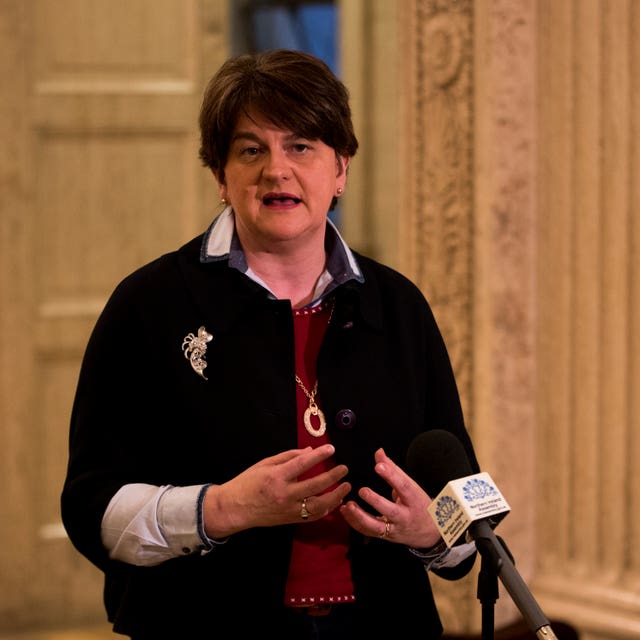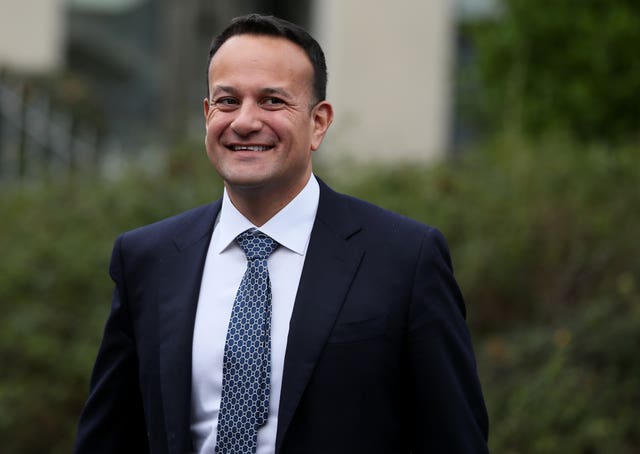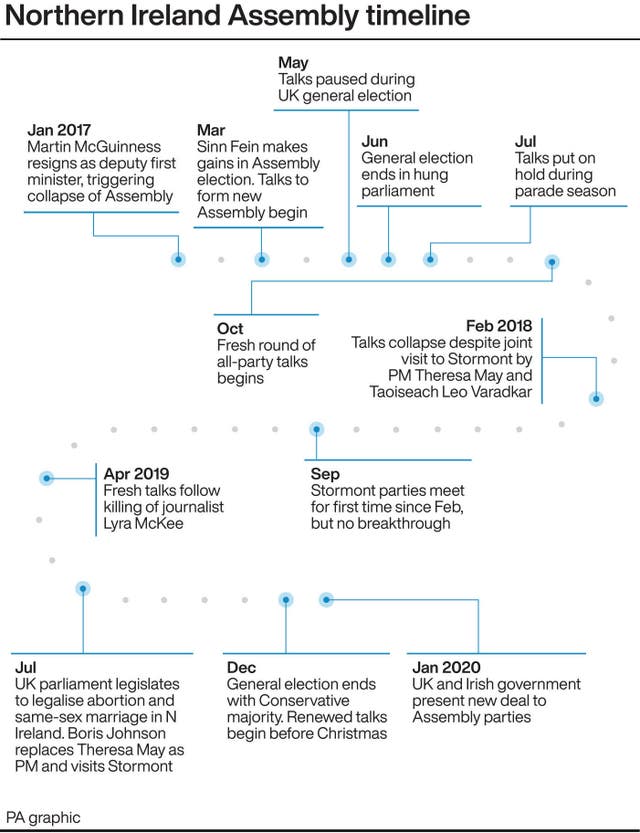
A Government investment package to tackle funding problems in Northern Ireland’s struggling public services will only be delivered if Stormont returns, the Secretary of State has warned.
Heaping pressure on politicians to agree a deal to restore powersharing, Julian Smith said the financial support, predicted to run into billions of pounds, is dependent on them getting back to work.
Ms Smith stressed the conditional nature of the cash offer as Sinn Fein continued to decide whether to back the draft agreement tabled by the UK and Irish governments – a move that would confirm a return to powersharing.
Decision day at Stormont has coincided with another strike by workers in the region’s crisis-hit health service. Picketing nurses descended on Stormont on Friday morning to highlight their demands over pay and staffing shortages.
Mr Smith said the money is there to resolve that dispute, and other pressing funding shortfalls in the public sector, but only if devolution is restored.
He said he has received assurances from trade union leaders that if the parties re-enter government, they will call off the health workers’ action.
“The package is dependent on the Executive getting back up and running,” he said on a visit to a primary school in Maghaberry, Co Antrim.
In a dramatic night of developments on Thursday, the two governments jointly published a suggested deal and urged the five main parties to sign up and re-enter the institutions.
This came as Mr Smith wrote to the Speaker of the defunct Assembly, asking him to convene a sitting on Friday – thus issuing a challenge to the parties to turn up and get back to business.

But Speaker Robin Newton has insisted he will only recall a session of the Assembly if he gets an indication that both parties are willing and able to form an Executive.
The DUP, the party blamed by both governments for holding up a deal in December, responded positively to the published New Decade, New Approach text.
Party leader Arlene Foster said there is a basis to re-establish the devolved institutions in a “fair and balanced way”.
All eyes are now on Sinn Fein – the other party whose agreement is required to secure the return of a mandatory coalition executive.
The republican party called a meeting of its ruling council to deliberate on the proposals to resolve long-running wrangles on issues such as legislative protections for Irish language speakers.
Sinn Fein is expected to make an announcement later on the outcome of the Ard Chomhairle’s (ruling council) decision.
The national officer board met earlier on Friday to prepare a recommendation for Ard Chomhairle members to either accept or reject the deal.

Sinn Fein president Mary Lou McDonald said: “We are studying the text and will give it careful consideration.”
If Sinn Fein does sign up to the proposals, it is possible the Assembly could sit later on Friday, though Saturday might be more realistic.
Mr Smith’s stance on the funding is backed by the Prime Minister.
Downing Street said the new deal is “fair and balanced” and urged parties in the region to accept the terms.
A spokesman for the Prime Minister said: “Agreement could see the Executive and Assembly restored as early as today.
“Should an agreement be reached, reforms to the health service, education and justice will be prioritised by a new Executive.
“It is up to the parties to come together now and accept this deal in the interest of everyone in Northern Ireland.”
Asked about the money on offer as part of the brokered deal for Northern Ireland, the Number 10 spokesman said: “The financial package is entirely dependent on the parties coming together to restore the Executive.
“Precise figures of financial support will be finalised when an agreement is reached.”

Irish premier Leo Varadkar, meanwhile, said there is a “real chance” to restore powersharing on Friday, as he appealed to the parties in Northern Ireland to sign up to the new deal.
“I think there is a real chance that today, or if not by Monday, we can have the Northern Ireland Assembly and Executive back up and running again,” said the Taoiseach in Dublin.
“I think this is the opportunity, I’d really appeal to all parties now to sign up to the agreement and come on board.”
The three smaller Stormont parties involved in the process – the SDLP, Ulster Unionists and Alliance – could also take seats in the ministerial Executive, though their presence is not a prerequisite for forming a government.
SDLP leader Colum Eastwood, who met with Mr Smith on Friday, said he had been told the package on offer is “very significant”.
He added: “We wanted to talk to the Secretary of State this morning to make sure that the financial envelope was large enough to cope with the asks that we had.

“We are told that it is a very significant package.”
The last DUP/Sinn Fein-led coalition government collapsed in January 2017 over a row about a botched green energy scheme.
That dispute subsequently widened to take in more traditional wrangles on matters such as the Irish language and the thorny legacy of the Troubles.
The deal represents the governments’ joint assessment of how the long-standing wrangles can be resolved.
The parties had been working to a Monday deadline to restore the institutions.
On Monday, legislation to give civil servants extra powers to run the region’s troubled public services expires and the UK Government assumes a legal duty to call a fresh Assembly election.


Comments: Our rules
We want our comments to be a lively and valuable part of our community - a place where readers can debate and engage with the most important local issues. The ability to comment on our stories is a privilege, not a right, however, and that privilege may be withdrawn if it is abused or misused.
Please report any comments that break our rules.
Read the rules here